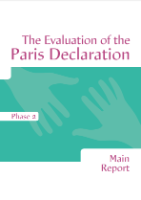Evaluation of development programmes
Evaluation of the implementation of the Paris Declaration
An independent evaluation of the implementation of the The Paris Declaration has been undertaken. The evaluation looks at how the principles of aid effectiveness have been put into practice by international development partners and what results this is having in developing countries. The evaluation was managed by an independent reference group that includes country partners and was a key input to the Busan High Level Forum.
|
|
View full report (May 2011)
|
How has the Paris Declaration impacted people in developing countries?
The overall impact has been positive. However, while the Paris Declaration reforms have contributed to a better quality of aid, to more transparent and effective partnerships, and to supporting rising volumes of aid, challenges remain. The key point is clear: now donors need to walk the talk of the Paris Declaration.
The Paris Declaration poses an important challenge to the world of development cooperation. Compared with previous joint statements on aid harmonisation and alignment, it provided a roadmap with specific targets to be met by 2010 and definite review points in the years between. The number of countries and international organisations participating in the 2005 High Level Forum (HLF) and putting their signature to the joint commitments contained in the Declaration was unprecedented, reflecting a progressive widening of the range of voices included in major meetings convened by the OECD DAC.
The evaluation of the implementation of the Paris Declaration is an integral part of the Declaration itself. The first phase of the evaluation, which was presented at the HLF in Accra, is an early evaluation and focuses on ways of improving and enhancing implementation, rather than giving any definite judgement about effectiveness.
Related Documents
